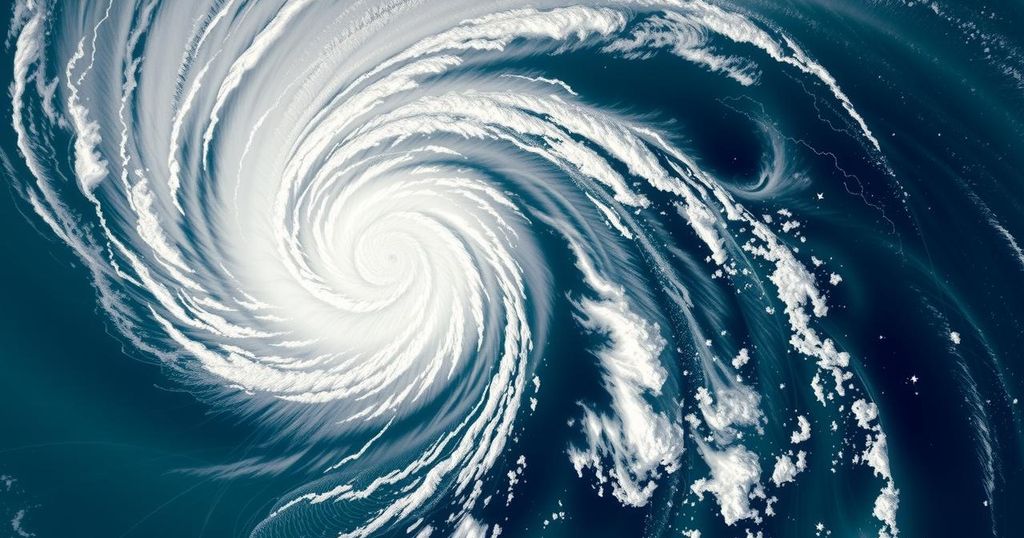Cyclone Chido Causes Extensive Damage in Mayotte, Threatens Eastern Africa
Tropical Cyclone Chido devastated Mayotte, bringing winds over 220 km/h and significant destruction. No casualties have been reported, but emergency services are mobilizing. The cyclone threatens Mozambique, affecting 2.5 million people, while neighboring regions prepare for potential flooding. Recent storms underscore increasing climate change impacts on humanitarian crises in southern Africa.
Tropical Cyclone Chido wreaked havoc across the French territory of Mayotte in the Indian Ocean, delivering winds exceeding 220 kilometers per hour as it advanced toward the eastern coast of Africa. The storm left significant destruction in its wake, with reports indicating that many residents lost their belongings and countless homes sustained severe damage. Fortunately, there are currently no reports of casualties. Mayotte Prefect Francois-Xavier Bieuville described this event as the most destructive cyclone experienced on the islands since 1934, urging residents to seek shelter as the region remained under a red alert for public safety.
The immediate aftermath of Chido highlighted substantial disruptions, including widespread power outages and the obliteration of small structures and trees. Emergency services have been prompt in their response, with French Interior Minister Bruno Retailleau noting that state and local services are fully mobilized to assist in recovery efforts. Notably, 110 emergency responders from France and Reunion have been deployed, with an additional contingent of 140 scheduled to arrive shortly.
As Cyclone Chido continued its trajectory, it impacted the nearby Comoros islands, prompting authorities to enforce high alert measures and close ports and airports. The situation has raised concern for a group of fishermen who have not been heard from since venturing out to sea. Forecasts indicate that the cyclone is expected to strike Mozambique imminently, posing a threat to approximately 2.5 million individuals in the northern provinces.
Preparations are underway in neighboring landlocked nations such as Malawi and Zimbabwe, which are bracing for potential flooding and urging residents in vulnerable areas to relocate to safer ground. Cyclone season—from December to March—has increasingly unleashed severe storms in the southeastern Indian Ocean, reminding many of recent tragedies such as Cyclone Idai in 2019, which resulted in significant loss of life across multiple countries. Experts are raising alarms over climate change’s role in exacerbating these natural disasters, which disproportionately affect poorer nations in Southern Africa despite their minimal contributions to global climate change.
Cyclone Chido represents a continuation of the tumultuous cyclone season experienced in the southeastern Indian Ocean, a period marked by the upswing in natural disasters. Cyclones like Chido not only inflict immediate physical damage but also leave lasting effects on public health, as stagnant water left in the wake of storms often leads to cholera outbreaks and increased rates of malaria and dengue fever. The humanitarian crises triggered by these cyclones are particularly devastating for poorer nations, such as those in southern Africa, which face an uphill battle in response and recovery despite their negligible output concerning climate change. Notorious cyclones in the past, including Cyclone Idai and Cyclone Freddy, have already demonstrated the potential for widespread devastation in this region.
In summary, Tropical Cyclone Chido has inflicted severe damage on Mayotte and surrounding areas, prompting emergency responses and raising concerns for the approaching storm’s impact on Mozambique and neighboring nations. The cyclone season presents grave risks not only in terms of immediate destruction but also long-term public health crises, exacerbated by the effects of climate change. Efforts must be directed towards comprehensive strategies to address both immediate recovery and long-term resilience against such increasingly common disasters.
Original Source: www.voanews.com




Post Comment